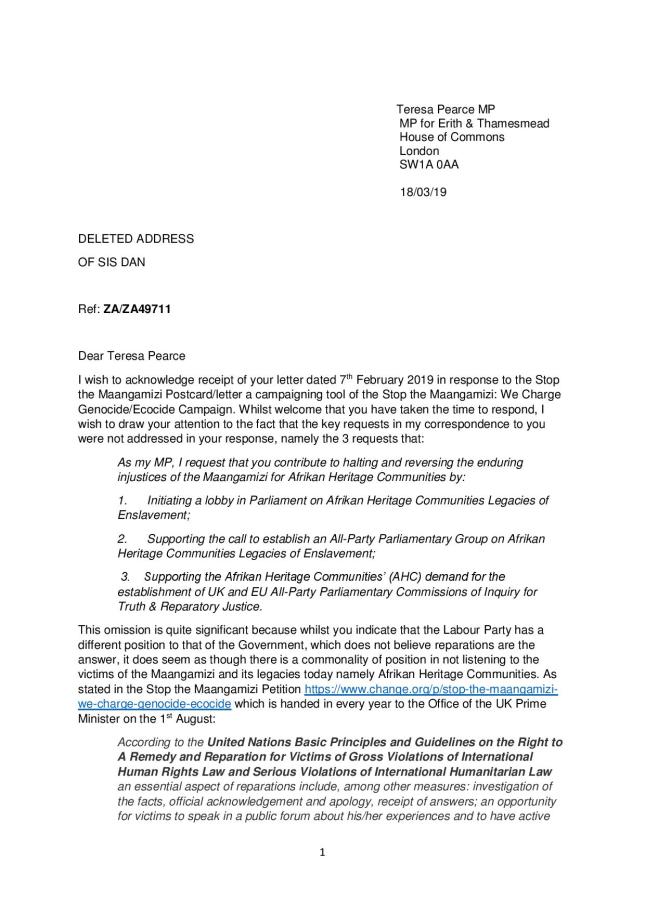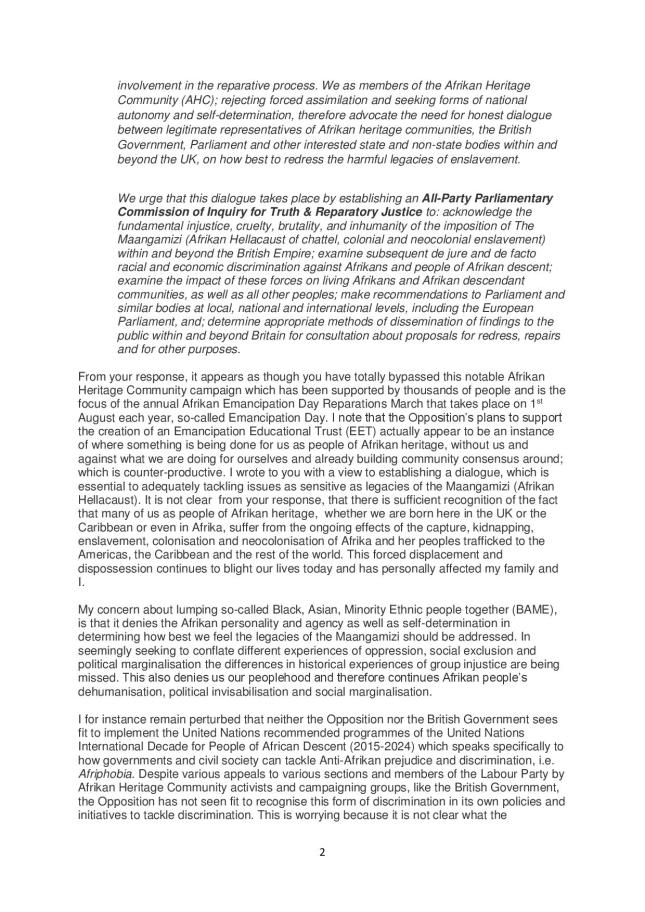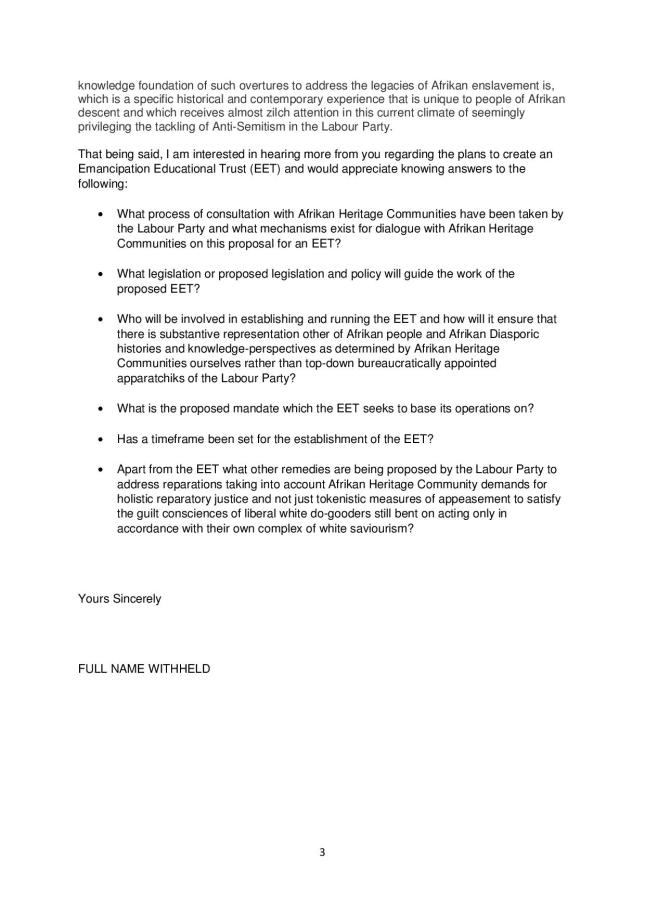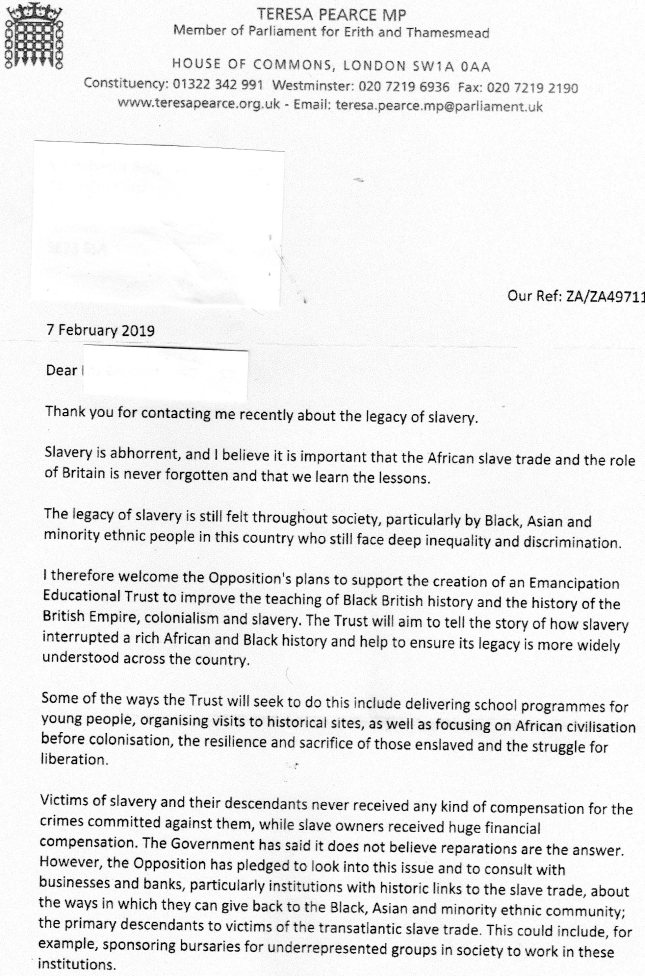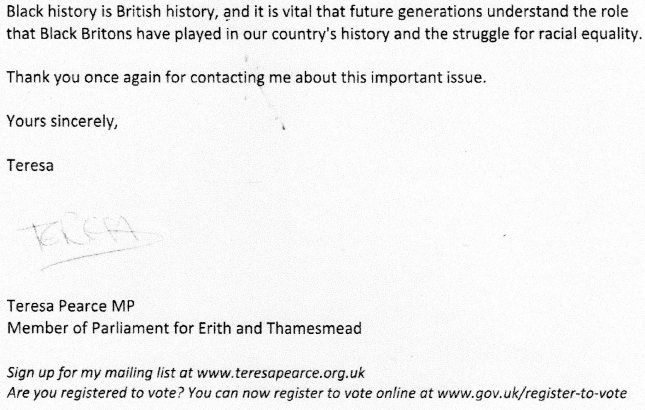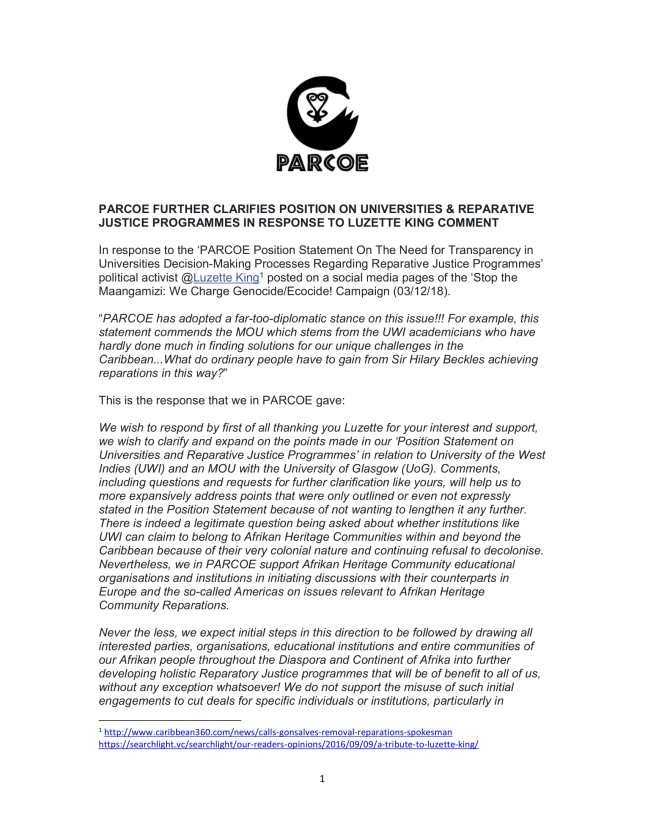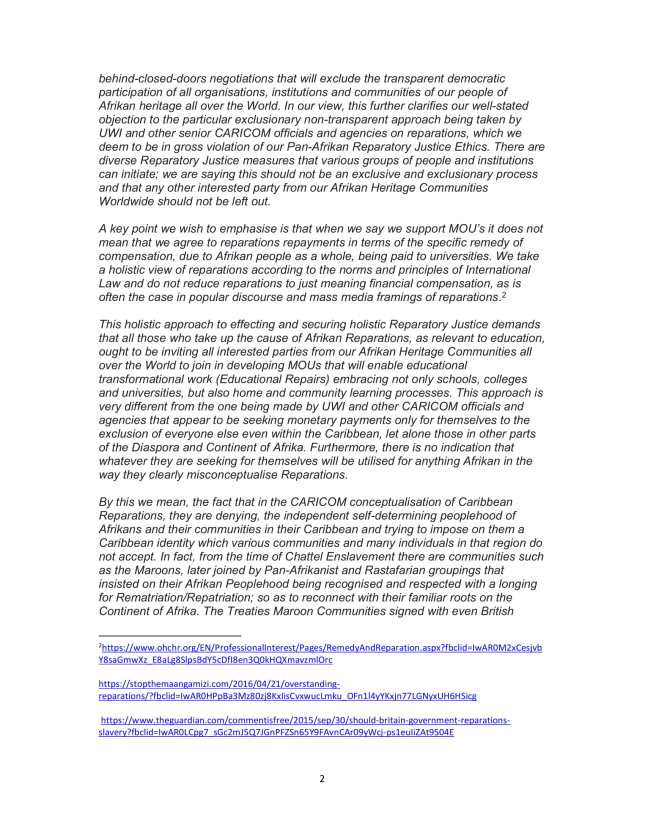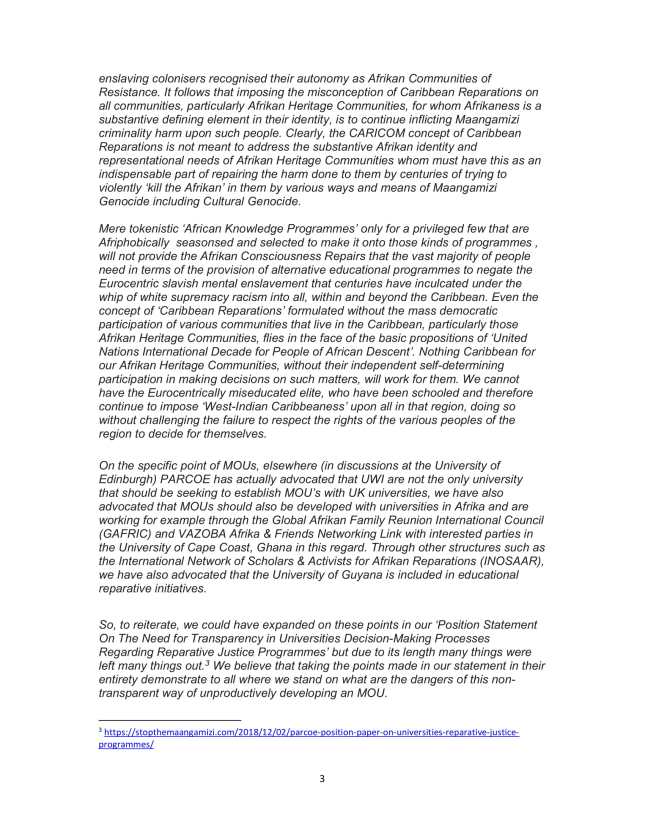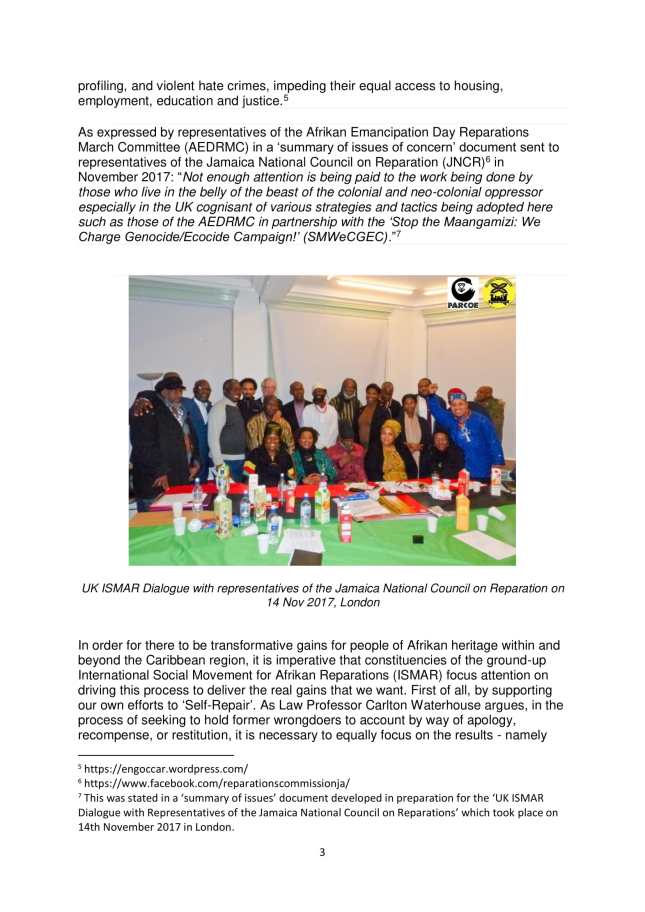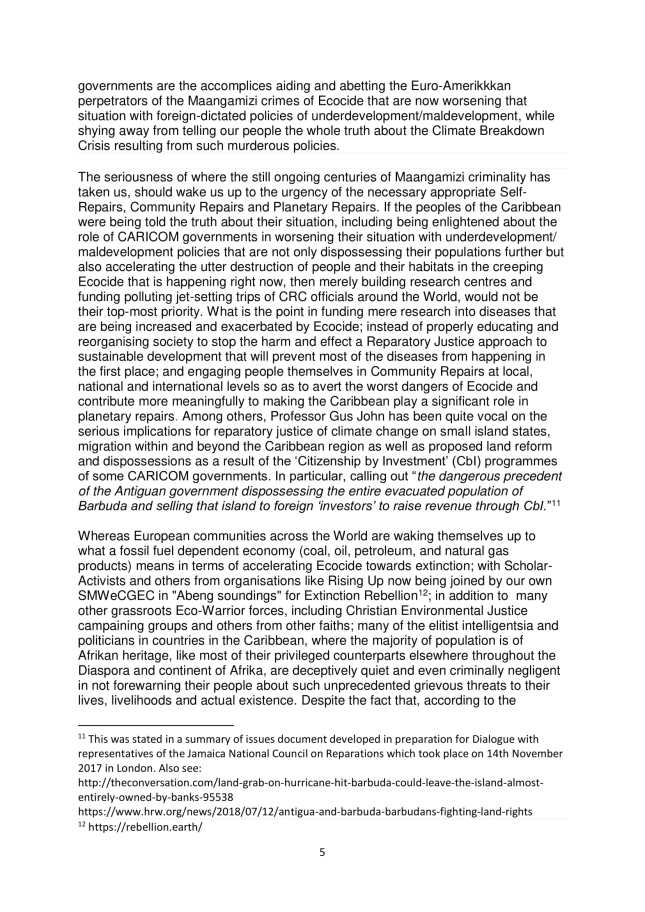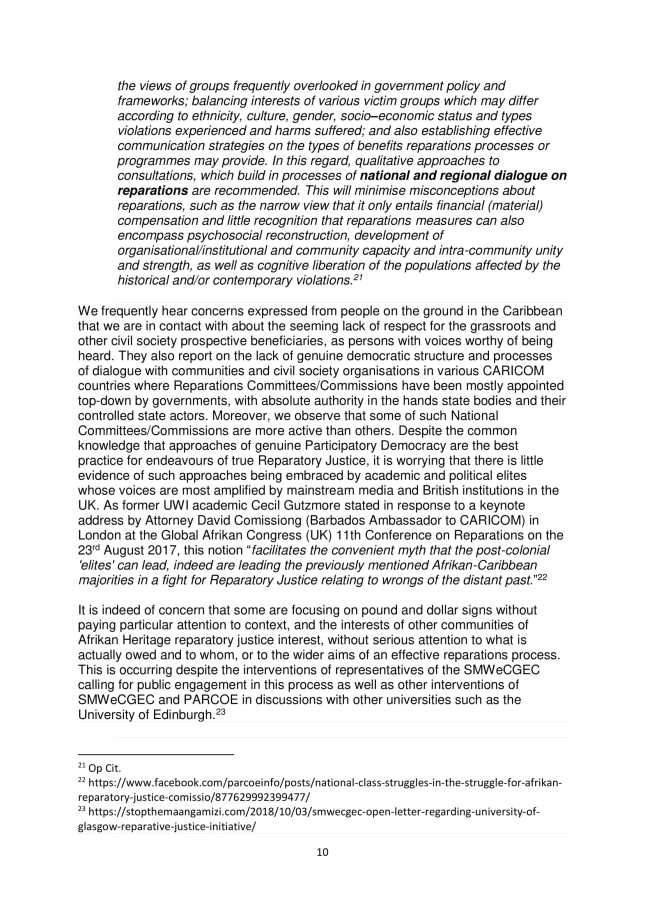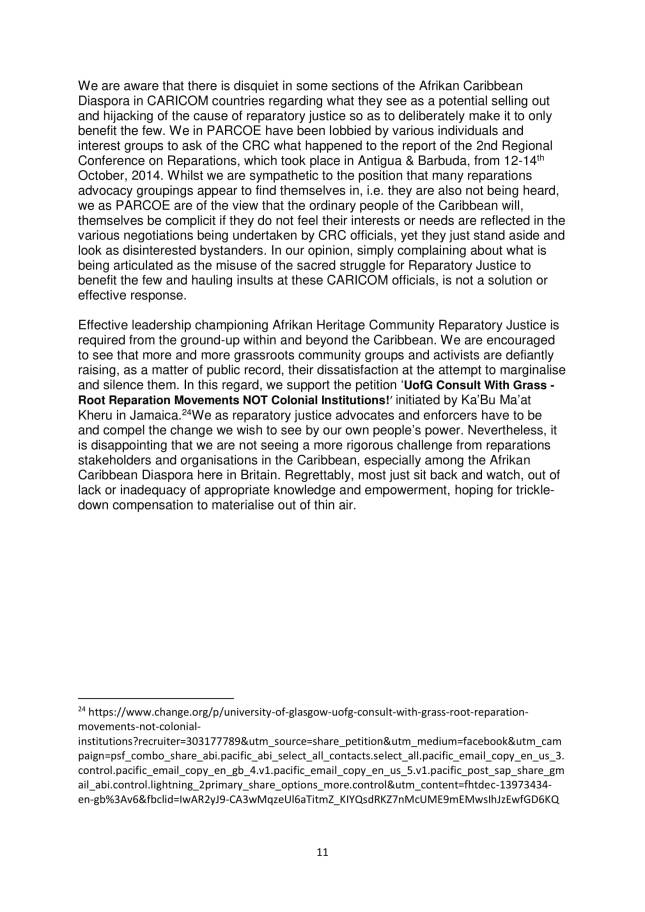
Greetings Supporters of the ‘Stop the Maangamizi: We Charge Genocide/Ecocide!’ Campaign (SMWeCGEC)
This is a report-back of a meeting and series of correspondence between ‘Stop the Maangamizi: We Charge Genocide/Ecocide!’ Campaign (SMWeCGEC) Advocate Esther Stanford-Xosei and Heidi Alexander, Member of Parliament for Lewisham East.





Follow-up letter to Heidi Alexander dated 20th January 2018 requesting her to take action on the ‘Stop the Maangamizi!’ Postcard
ESTHER STANFORD-XOSEI LETTER TO HEIDI ALEXANDER ON TAKING ACTION ON THE SMWeCGEC POSTCARD
On Friday 9th February 2018, Esther Stanford-Xosei went to see her MP Heidi Alexander regarding the demands in the ‘Stop the Maangamizi!’ Postcard campaign
Upon visiting Heidi at my local surgery, she was asked to explain the purpose of my visit and what I wanted which gave me some opportunity to explain the holistic meaning of reparations and why it is relevant to the local community development and campaigning efforts of Afrikan heritage community groups organising in the borough of Lewisham and working on Maangamizi legacy issues. She explained that the simple notion of ‘pay us’ is not what holistic reparations are about (and tend to close off discussions) and rather the starting point in addressing reparations is to take action on instituting the APPCITARJ.
It was acknowledged that the most focus of elected officials would be looking at reparations policy-making in addressing to meeting community development needs in all areas of people activity where our people are working to address the impact of the Maangamizi by way of community self-repairs. Therefore, prioritisation should be given to hearing our perspectives on these issues and hearing from us about the impact of the Maangamizi locally, nationally and internationally and also finding out from Afrikan heritage communities what efforts we are taking to redress it ourselves, irrespective of government responsibility or action to do the same. This made sense to her in light of a similar approach which was initiated with former Home Office Minister for Race & Communities Fiona McTaggert, MP in 2004 by the Rendezvous of Victory (ROV) which Esther Stanford-Xosei and Kofi Mawuli Klu, leading members of the SMWeCGEC, were founder-members of, (see flier below ‘Commemorations 2004-7: Time to Resolve the Big Question of Reparations’ where a programme was launched acknowledging reparations from the approach I have highlighted above).

This approach is also in alignment with the approach we are encouraging in the SMWeCGEC and support organisations in relation to Afrikan heritage community self-repairs (Maatubuntujamaa /Afrikan Heritage Community for National Self-Determination – AHC-NSD building as a model of a community repairing itself, see ). It was agreed that this is seen as a more viable approach to addressing reparations which is most likely to get support from elected officials who will be concerned with redress via local and central government policy-making and is most likely to secure short-medium term reparations goals in terms of what is referred to as administrative reparations processes. Heidi Alexander acknowledged that no issue facing people of Afrikan heritage today whether it is Anti-Black racism and/or Afriphobia, school exclusions, gun and knife crime, gangs, racial profiling, homelessness, health challenges, unemployment etc. could be tackled without acknowledging the impact of the Maangamizi on Afrikan heritage communities. Esther Stanford-Xosei that it is Afrikan heritage community self-repairs initiatives which need to be better resourced and supported as at the community level, we as Afrikans also have the responsibility to be and become the change we wish to see.

Indeed, part of the repair is about Afrikan heritage communities developing our own community capacity and power-base as well as our own community rebuilding plan, which the SMWeCGEC recognise as ‘Pempamsie’ Afrikan Heritage Community Self-Repairs planning (Pempamsie is the Adinkra symbol for sewing together in readiness -preparatory actions for reparatory justice. building our future out of our principled operational unity despite our diversity). This planning is something that was championed in the Black Quest for Justice Campaign (BQJC) plan which was developed in 2003 as a result of the BQJC legal challenge to the UK government on Pan-Afrikan Reparations for Global Justice and also contributed to the development of the SMWeCGEC.
Afrikan Community Self-Repairs are the self-determined efforts that need to be made in building our own power, in such a way, that Afrikan heritage communities are able to identify and enhance ongoing work towards stopping the contemporary manifestations of the Maangamizi, which are putting the individuals, families and other social groups that make up our communities into a state of disrepair; as well as reasoning and consciously carrying out the alternative solutions for glocally rebuilding our power base as communities, in such a way that that they are eventually transformed, in accordance with the principles and programmatic demands of Pan-Afrikan Reparations for Global Justice.
Esther Stanford-Xosei was therefore able to put into the context the importance and practicalities of the All-Party Parliamentary Commission of Inquiry for Truth & Reparatory Justice (APPCITARJ) and the need for local data and hearings to assess the situation of people of Afrikan heritage locally. With the emphasis being on – recognise our people’s agency and self-determining community development initiatives which should be receiving greater support and resourcing. This includes initiatives in relation to implementation of the UN International Decade for People of African Descent (IDPAD).
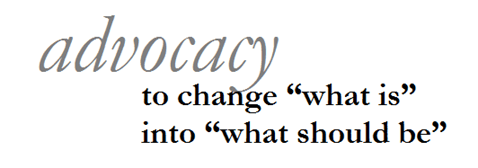
The main points raised with Heidi Alexander were:
· Hear what Afrikan people are trying to do for themselves (Afrikan Heritage Community self-repairs) within and beyond the borough of Lewisham;
· The intergenerational work being done to address the Maangamizi on the part of Afrikan heritage communities which will be as aspect of the proposed hearings of the APPCITARJ and provide an opportunity to hear about work being done to address the Maangamizi which should be recognised, better supported and resourced. It is not about saying to officials come and do something about our situation which reinforces our people’s powerlessness and denies their agency whilst the state and local government has responsibilities to support our self-determined efforts as we know best what is working and what is not working for our people.
· Addressing the impact of the Maangamizi requires embarking on international conversations and actions galvanised by the IDPAD as even our communities own solutions are global and many activists involved in the SMWeCGEC work glocally. It follows that the UK government cannot adequately support Afrikan heritage communities locally or even regionally without recognising Afrikan people’s international legal personality as Afrikans who are connected to other people of Afrikan heritage within and beyond the UK which is part of our own re-empowerment process.
The three asks of Heidi Alexander were:
1. Heidi to support APPCITARJ Glocal Roundtables which are local hearings which hear Afrikan heritage community roundtables on the Maangamizi, efforts to address it and the IDPAD. It was suggested that in Lewisham we can use the model of the Peoples Commission of Inquiry on Saving Lewisham Hospital as a template.
2. Heidi to write to the related appropriate Minister in support of the main goals of the ‘Stop the Maangamizi!’ Petition.
3. Heidi to host or support, with other MPs, a meeting in Parliament on ‘The Academic Legitimacy for the Afrikan Reparations Case in British State Policy Making & Political Lobbying’ in association with the International Network of Scholars & Activists for Afrikan Reparations (INOSAAR), where the SMWeCGEC in association with the Afrikan Emancipation Day Reparations March Committee which facilitates the organisation of the annual 1st August Afrikan Emancipation Day Reparations March and are engaged in UK reparations social movement-building actions which are contributing to knowledge-production through action-learning on reparations can be profiled. This is something which we are also encouraging other INOSAAR activists to do.

Outcome
Heidi Alexander wanted to know what was unsatisfactory about the response from the Foreign & Commonwealth Office (FCO) to the ‘Stop the Maangamizi!’ Petition and its accompanying letter presented to the office of the UK Prime Minister Theresa May on 1st August 2017. She asked Esther Stanford-Xosei to email her to guide her follow-up enquiry to the relevant minister. Heidi Alexander stated that that she believed the issues Esther raised are very important for the Afrikan Heritage Community in Lewisham (46% so-called Black and other racialised and minoritized groups population of which about 32% is Afrikan heritage and local schools having 76% youth from Black and other racialised and minoritized groups !!!).
Regarding glocal APPCITARJ hearings and addressing the concerns locally, Heidi wanted to know what work is being done in other boroughs that Lewisham could learn from and she specifically asked which other MPs have expressed a willingness to support the ‘Stop the Maangamizi!’ postcard campaign objectives. She said that Esther should provide info about what is happening in other boroughs which was good practice that Lewisham could perhaps also pilot.
In relation to the meeting in Parliament, Heidi said that it was unlikely that she could host such a meeting as most of her parliamentary work is focused on Brexit and reforms of the NHS (which was an indication about how to also further present/frame aspects of the SMWeCGEC to gain local interest from MPs such as herself).
Heidi also stated that the local Labour Party ‘BAME representative’ is someone she wanted to connect me with as he would be very interested in the issues Esther raised.
Going forward, we in the SMWeCGEC cannot stress enough the importance of more of us making similar approaches to other MPs and elected officials.

ESTHER STANFORD-XOSEI LETTER TO HEIDI ALEXANDER REGARDING THE FCO RESPONSE setting out what is wrong with the response received from the Foreign & Commonwealth Office to the 2017 ‘Stop the Maangamizi!’ Petition & its accompanying letter.



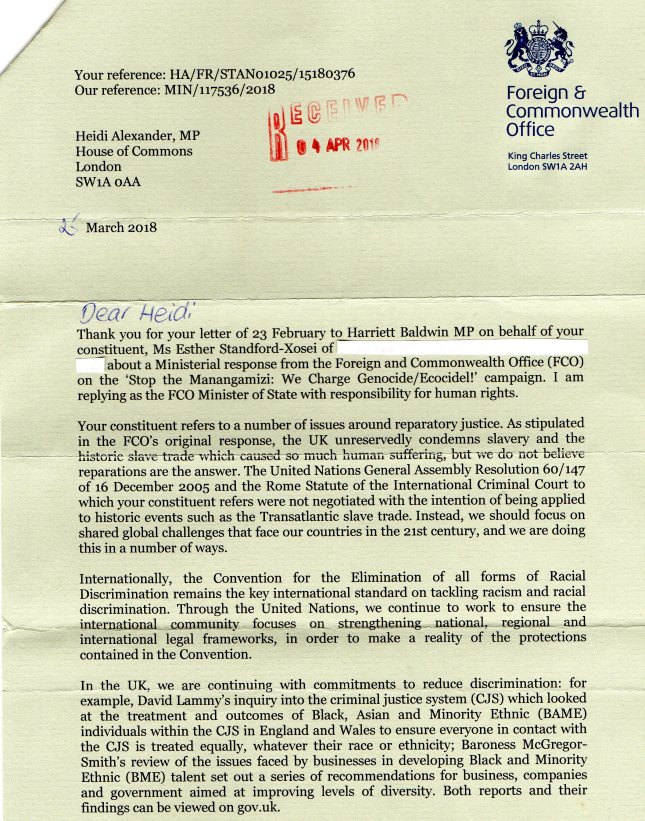

This link includes the response sent to Heidi Alexander MP further to receiving the above response from Lord Ahmad.
See here for the ‘Stop the Maangamizi!’ Postcard and template letter.
Check out this guidance on lobbying MPs and other elected officials.
In Service
Stop the Maangamizi: We Charge Genocide/Ecocide! Campaign International Steering Committee Spearhead Team (ISC-SMWeCGEC)




